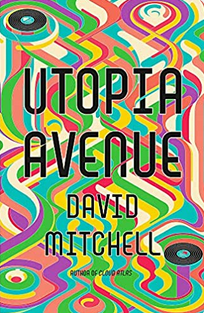PBS Communications have been involved in helping users get exactly the right colour output, and to print on a variety of papers, heavy, embossed, shiny.
It all comes together in a vibrant UK publishing industry.
PBS Communications are enduring enthusiastic readers and talk about nothing else at the end of week wind down.
Here begins the first PBS Communications book review:
Utopia Avenue. David Mitchell (2020) 564 pages. ISBN: 9781444799422
Why does David Mitchell choose to write such long books?
I would like to give it to friends, because I think it’s a fabulous novel, and so I guess it will have to be for those in retirement, for those long distance commuters, and those who prioritise reading novels (and who recall the ‘60s and ‘The Summer of Love’).
Utopia Avenue is an uncomplicated chronicle of youth culture and the explosion of youthful protest against the establishment. World War Two is now twenty years past.
When Jasper, one of four band mates who make up Utopia Avenue, is verbally insulted at a wedding by colonel x and brigadier y and major z, it takes nothing more than his long hair to set off older generation apoplexy.
My own recollections of my father came flooding back. When the school photo arrived: “why is your hair the longest? You look like a girl”!
Mitchell always writes well about England, of London, and Gravesend (!), and the first part of the book has the signature Mitchell focus on the local pub, and families hustling in local communities. Via Dean, a cast of local notables keep him (the rockstar), relatively grounded. The second half of the book shifts to America. Initially New York and then a Jerry Garcia, Grateful Dead, trip into the never never land (and California!). The American section works well, and of all the real life rock stars and singers who populate the book, and who gave their own fictional voices, it’s Garcia and Frank Zappa who balance the expected hedonism with home spun reflection and philosophy of the times (especially 1966/7).
Even if you are not old enough to have lived through the sixties, or have parents who did so, the attention grabbing, headline – making, antics of the bands remain very familiar and memorable. This is a world in which the Beatles and the Rolling Stones (particularly), drew opprobrium and adulation in equal measure.
One other trademark Mitchell literary device also makes its way into the book. With guitarist Jasper as the outlet, the reader is abrupt thrust into travel back in time; to the horologists, Esther Little, and Marinus.
If you love most/all of Mitchell’s work, this is a welcome addition to the ongoing reference of good vs evil and deeper darker forces among us, that Mitchell so delights in.
For a stand alone reading experience, and especially in a contemporary setting about music, it didn’t work quite as well in this particular novel, and I say that as an enthusiast.
By all means write intelligently and sensitively about the trauma surrounding schizophrenia (and Mitchell does so), but this could have been done without the horologists, couldn’t it?
Staying with the music, the storyline put together by Mitchell could apply to any decade from the sixties onwards. In a fictionalised format I found this much more satisfying than the biographies I’ve read about individual singers and bands, whose self praise and arrogance is sometimes too much.
There is plenty on “groupies”. The commercial reality of future royalties and distribution of money between song writers, management writing credits is ever present. In recent years George Michael and Taylor Swift among many others come to mind. How many bands split and/or refused to reform as a consequence of monetary discord rather than musical differences? Touring and press conferences and promotional activity. Nothing has changed, and its young people in their early twenties, with little or no media training who are the arbiters of opinion and fashion.
This book was published just as Covid 19 hit the world, and I suspect this has meant that it got less coverage than might be expected. I enjoyed the book very much and I know exactly which “musos” I will be encouraging to read it.


